Podcast: Play in new window | Download (Duration: 10:09 — 7.2MB) | Embed
Subscribe: Apple Podcasts | Spotify | Amazon Music | Android | Pandora | iHeartRadio | JioSaavn | Podchaser | Gaana | Podcast Index | Email | TuneIn | Deezer | Anghami | RSS | More
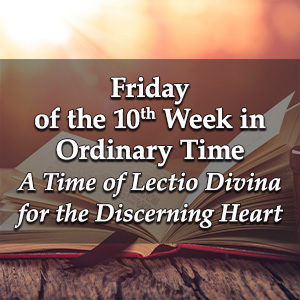 Friday of the Tenth Week of Ordinary Time – A Time of Lectio Divina for the Discerning Heart Podcast
Friday of the Tenth Week of Ordinary Time – A Time of Lectio Divina for the Discerning Heart Podcast
As you begin, take a deep breath and exhale slowly. For at least the next few moments, surrender all the cares and concerns of this day to the Lord.
Say slowly from your heart “Jesus, I Trust In You…You Take Over”
Become aware that He is with you, looking upon you with love, wanting to be heard deep within in your heart…
From the Holy Gospel According to Matthew 5:27-32
Jesus said to his disciples: ‘You have learnt how it was said: You must not commit adultery. But I say this to you: if a man looks at a woman lustfully, he has already committed adultery with her in his heart. If your right eye should cause you to sin, tear it out and throw it away; for it will do you less harm to lose one part of you than to have your whole body thrown into hell. And if your right hand should cause you to sin, cut it off and throw it away; for it will do you less harm to lose one part of you than to have your whole body go to hell.
‘It has also been said: Anyone who divorces his wife must give her a writ of dismissal. But I say this to you: everyone who divorces his wife, except for the case of fornication, makes her an adulteress; and anyone who marries a divorced woman commits adultery.’
What word made this passage come alive for you?
What did you sense the Lord saying to you?
Once more give the Lord an opportunity to speak to you:
Jesus said to his disciples: ‘You have learnt how it was said: You must not commit adultery. But I say this to you: if a man looks at a woman lustfully, he has already committed adultery with her in his heart. If your right eye should cause you to sin, tear it out and throw it away; for it will do you less harm to lose one part of you than to have your whole body thrown into hell. And if your right hand should cause you to sin, cut it off and throw it away; for it will do you less harm to lose one part of you than to have your whole body go to hell.
‘It has also been said: Anyone who divorces his wife must give her a writ of dismissal. But I say this to you: everyone who divorces his wife, except for the case of fornication, makes her an adulteress; and anyone who marries a divorced woman commits adultery.’
What did your heart feel as you listened?
What did you sense the Lord saying to you?
Once more, through Him, with Him and in Him listen to the Word:
Jesus said to his disciples: ‘You have learnt how it was said: You must not commit adultery. But I say this to you: if a man looks at a woman lustfully, he has already committed adultery with her in his heart. If your right eye should cause you to sin, tear it out and throw it away; for it will do you less harm to lose one part of you than to have your whole body thrown into hell. And if your right hand should cause you to sin, cut it off and throw it away; for it will do you less harm to lose one part of you than to have your whole body go to hell.
‘It has also been said: Anyone who divorces his wife must give her a writ of dismissal. But I say this to you: everyone who divorces his wife, except for the case of fornication, makes her an adulteress; and anyone who marries a divorced woman commits adultery.’
What touched your heart in this time of prayer?
What did your heart feel as you prayed?
What do you hope to carry with you from this time with the Lord?
Our Father, who art in heaven,
hallowed be thy name.
Thy kingdom come.
Thy will be done on earth, as it is in heaven.
Give us this day our daily bread,
and forgive us our trespasses,
as we forgive those who trespass against us,
and lead us not into temptation,
but deliver us from evil.
Amen

 St. Anthony of Padua – The Doctors of the Church: The Charism of Wisdom with Dr. Matthew Bunson
St. Anthony of Padua – The Doctors of the Church: The Charism of Wisdom with Dr. Matthew Bunson
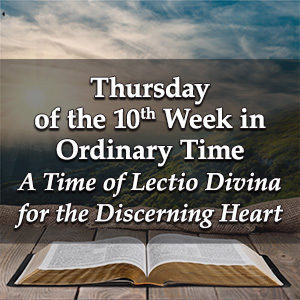 Thursday of the Tenth Week of Ordinary Time – A Time of Lectio Divina for the Discerning Heart Podcast
Thursday of the Tenth Week of Ordinary Time – A Time of Lectio Divina for the Discerning Heart Podcast

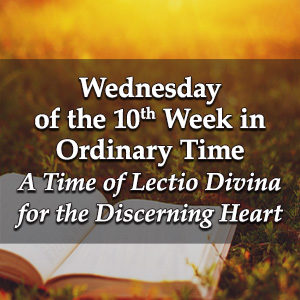 Wednesday of the Tenth Week of Ordinary Time – A Time of Lectio Divina for the Discerning Heart Podcast
Wednesday of the Tenth Week of Ordinary Time – A Time of Lectio Divina for the Discerning Heart Podcast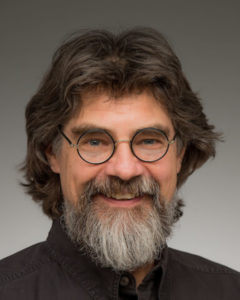




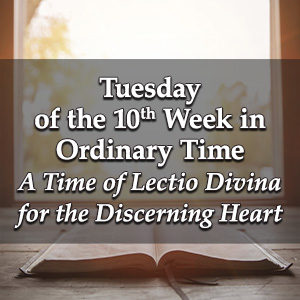 Tuesday of the Tenth Week of Ordinary Time – A Time of Lectio Divina for the Discerning Heart Podcast
Tuesday of the Tenth Week of Ordinary Time – A Time of Lectio Divina for the Discerning Heart Podcast

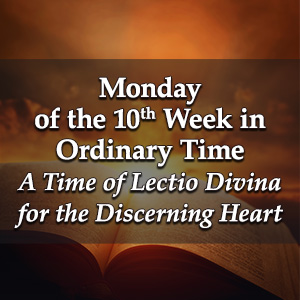 Monday of the Tenth Week in Ordinary Time – A Time of Lectio Divina for the Discerning Heart Podcast
Monday of the Tenth Week in Ordinary Time – A Time of Lectio Divina for the Discerning Heart Podcast